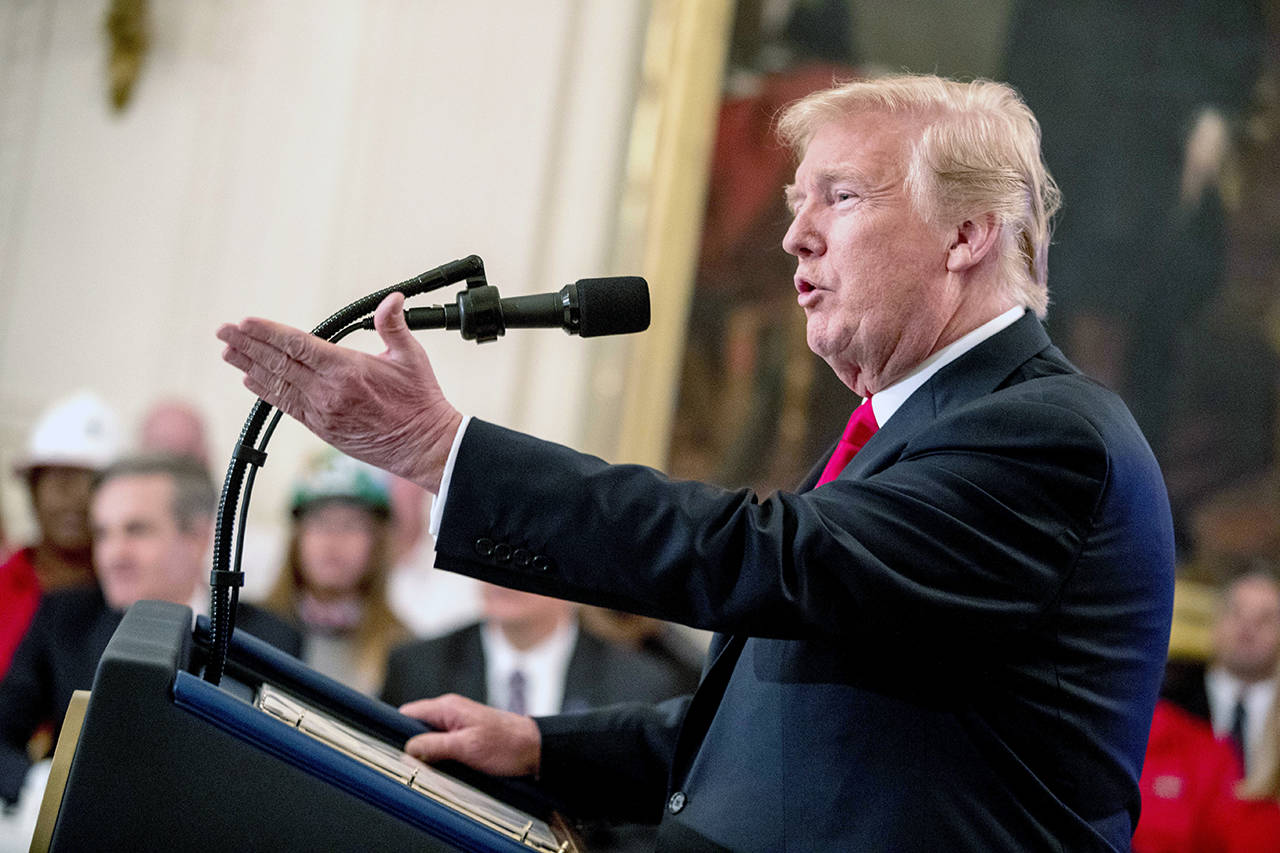By Paul Wiseman / Associated Press
WASHINGTON — President Donald Trump on Friday escalated his threats to punish China for its trade policies, warning anew that he’s prepared to impose tariffs on all Chinese imports and arguing that Beijing has manipulated its currency at the expense of the United States.
In a taped interview with the business channel CNBC, Trump warning, “I’m willing to go to 500,” meaning he’s prepared ultimately to impose tariffs on $500 billion in Chinese imports — roughly the value of all the goods Beijing shipped to the United States last year.
Doing so would mean that American households and companies would have to pay sharply higher prices for all Chinese products, as long as the tariffs remained in effect. Trump has already imposed tariffs on $34 billion in Chinese goods, and Beijing has retaliated with tariffs on an equal amount of American exports.
Trump had earlier threatened to target up to $550 billion in Chinese products — a figure that exceeds the $524 billion in goods and services China actually shipped to the United States last year. But his remarks to CNBC caught financial markets by surprise Friday. U.S. stocks sank in early trading before rebounding.
Global markets have remained generally calm in recent weeks and months despite the eruption of a full-blown U.S.-China trade war and a host of other conflicts that Trump has ignited between the United States and key trading partners, including Canada and the European Union.
“I’ve been surprised that up until now, markets seem overly sanguine about the risks” of a trade war between the world’s two biggest economies, said David Dollar, senior fellow at the Brookings Institution’s China studies center and a former official at the World Bank and U.S. Treasury Department.
The tariffs the Trump administration has already imposed on $34 billion in Chinese imports are the outgrowth of a dispute over the predatory practices it says China has deployed to try to supplant America’s global supremacy in high technology. Those Chinese practices include cyber-theft and an insistence that American and other foreign companies hand over technology in exchange for access to the Chinese market.
Beijing’s retaliatory tariffs have hit American soybeans and pork. The two countries have also targeted an additional $16 billion of each other’s goods for an expected second round of tariffs. And last week, the administration announced plans for yet more tariffs on $200 billion worth of additional Chinese imports. In response, Beijing vowed “firm and forceful measures.”
Beijing is targeting, in particular, sectors like American agriculture that could harm Trump politically at home. But in the CNBC interview, the president said he was seeking to do only what’s fair.
“I’m not doing this for politics; I’m doing this to do the right thing for our country,” the president said. “We have been ripped off by China for a long time.”
Beijing can’t tax as many U.S. goods — the United States exports far less to China than it imports — but it has other tools. Its central bank is allowing China’s tightly controlled currency to drift lower against the dollar, a move that could help Chinese exporters. But such a maneuver could also spur an outflow of capital that Beijing has tried to stanch.
On Friday, the yuan dipped to a 12-month low of 6.8 to the dollar, off by 7.6 percent since mid-February.
Over the past three years, Beijing has gradually widened the narrow band in which the yuan is allowed to fluctuate, though regulators intervene regularly to guide its movement.
With trade tensions rising, so is the pushback from American business that fear potentially devastating consequences, not only from China but also from Europe, Canada and other countries in Asia.
Trump has ordered the Commerce Department to investigate whether auto imports pose a threat to U.S. national security that would justify tariffs or other trade restrictions. Earlier this year, he invoked national security as a justification for taxing imported steel and aluminum.
Auto tariffs would sharply escalate global trade tensions: The U.S. last year imported $192 billion in vehicles and $143 billion in auto parts — figures that dwarf last year’s $29 billion in steel and $23 billion in aluminum imports.
“Automobiles — that’s the 800-pound gorilla,” Brookings’ Dollar said.
On Friday morning, Trump for a second day also criticized the Federal Reserve, breaking with a long-standing tradition at the White House of avoiding any influence, real or perceived, on the independence of the U.S. central bank.
In a tweet, he said:
“China, the European Union and others have been manipulating their currencies and interest rates lower, while the U.S. is raising rates while the dollars gets stronger and stronger with each passing day — taking away our big competitive edge.”
Trump added, referring to the Fed’s rate increases: “The United States should not be penalized because we are doing so well. Tightening now hurts all that we have done.”
Last month, the Fed raised its benchmark rate for a second time this year and projected two more increases in 2018. Its rate hikes are meant to prevent the economy from overheating and igniting high inflation. But rate increases also make borrowing costlier for households and companies and can weaken the pace of growth.
Talk to us
> Give us your news tips.
> Send us a letter to the editor.
> More Herald contact information.

























